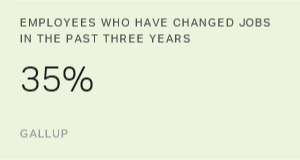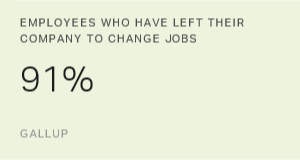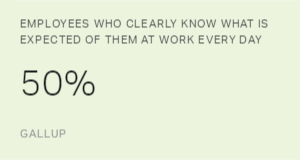Story Highlights
- Employees want a job that allows them to do what they do best
- Greater work-life balance and better personal well-being are critical
- Workers seek greater stability and job security
This is the first article in a two-part series.
What do workers value most in a job and organization? What would their dream job look like?
The answers to these questions can help organizations develop better attraction and recruitment strategies. These answers can also give them insights into why some of their employees, including many of their best ones, may be leaving.
More than one in three employees (35%) have changed jobs within the past three years, and 91% of employees left their company to do so, according to Gallup's State of the American Workplace report.
Gallup asked employees how important certain attributes are when they consider whether to take a job with a different organization. We found that employees place the greatest importance on a role and an organization that offers them:
- the ability to do what they do best
- greater work-life balance and better personal well-being
- greater stability and job security
- a significant increase in income
- the opportunity to work for a company with a great brand or reputation
This article focuses on the first three factors.
The Ability to Do What They Do Best
People in today's workforce are looking for more than a paycheck -- they are looking for a purpose and a chance to have coaching conversations that promote their development. This is evidenced in our finding that 60% of employees say the ability to do what they do best in a role is "very important" to them. This is the top factor stated.
When employees are a mismatch for their role and organization, they often struggle to succeed or become bored and restless. Their days -- or even their careers -- can feel wasted, along with their sense of purpose. Employees do their best in roles that enable them to integrate their talent (their natural capacity for excellence), skills (what they can do) and knowledge (what they know), which requires matching the right person with the right role and the right culture.
The solution to this lies in an organization's attraction, recruitment and hiring strategies, as well as in its human capital and performance management strategies.
From the job search to the day of hire, organizations must make it clear to potential employees that they value individual strengths and that they hire and develop people based on what they do well. Once hired, they need to consider how they are delivering on this individualized value proposition to retain current employees. This requires organizations to develop a systematic approach to identifying candidates who are the right fit for the role and culture, and to create an expectation that employee development and growth are a priority in the company.
Greater Work-Life Balance and Better Personal Well-Being
People are focused on their lives, not only their jobs. They don't want to compromise one at the expense of the other. As such, 53% of employees say a role that allows them to have greater work-life balance and better personal well-being is "very important" to them. Female employees are more likely than male employees to assign high importance to this job attribute, while millennials and Gen Xers are each more likely than baby boomers to do the same.
Work-life balance has various meanings that often include tactical and philosophical components for employees. Increasingly, people want to be able to adjust their hours and schedules as needed and to work remotely when they can without compromising work quality or productivity. A Gallup study on benefits and perks found that 51% of employees say they would switch to a job that allows them flextime, and 37% would switch to a job that allows them to work off-site at least part of the time.
That is why it's critical for employees to know how an organization "walks the talk" on greater work-life balance and well-being. Organizations should highlight what they offer to help employees balance work and life and improve their well-being, but they also need to make this discussion about culture. Flextime and similar perks are attractive, but they are beneficial only when employees truly feel empowered to use them.
Greater Stability and Job Security
Slightly more than half of employees (51%) rate greater stability and job security as "very important" in a new role. This number is consistent among male and female employees, as well as among millennials and Gen Xers. However, less than half of baby boomers say this aspect of a job is "very important" to them.
Candidates want to work for companies that provide solid footing and are poised for growth. The more stability they see in an organization, the more likely they may be to see a future with it.
To demonstrate stability in their brand, organizations can share their history of steady growth or their vision for future growth. They can also give specific examples of how they have survived tough economic times. What is most important is that candidates come away with a sense of why a company exists, what its reputation is and how it is positioned to capture more customers. Any company can say it has been around for "x" number of years, but candidates need to hear a story that resonates with them -- one that is unique, genuine and compelling.
Current employees also need to believe in the future of the organization and be able to see themselves participating in it. Leaders and managers are critical in creating this vision. Leaders have a duty to show employees where the organization is headed and to inspire them to see a better tomorrow, especially when economic conditions change. Managers must help their employees create career and development paths that link to a successful future. When employees are able to do what they do best and see the value they bring to their organization, they develop a deeper sense of job security.
The second article in this series focuses on the importance employees place on a significant increase in income and the opportunity to work for a company with a great brand or reputation.



